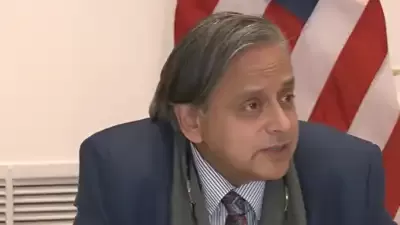Congress MP Shashi Tharoor, leading an all-party delegation to the United States under the banner of Operation Sindoor, delivered pointed remarks on India's historical attempts to normalize relations with Pakistan. Speaking at the Indian Consulate in New York, Tharoor reflected on the futility of past diplomatic overtures, citing the 2016 Pathankot Airbase attack and the 2008 Mumbai carnage as glaring reminders of Pakistan's continued patronage of cross-border terrorism. Drawing parallels with America’s post-9/11 response, Tharoor suggested that India must prioritize national security over symbolic gestures of peace when confronting hostile actors.
Revisiting the Pathankot Attack and Its Fallout
Tharoor, addressing members of the Indian diaspora in New York, highlighted a significant diplomatic misstep in the aftermath of Prime Minister Narendra Modi’s surprise visit to Pakistan in December 2015. Weeks after the high-profile engagement, terrorists infiltrated the Pathankot Airbase in January 2016, launching a brazen assault that shocked the security establishment.
“What followed was not only shocking in its audacity,” Tharoor recounted, “but also in our response. The Prime Minister, in a gesture of goodwill, invited Pakistan to join the investigation. The gesture, noble in its intent, was dismissed with insinuations that Indians had orchestrated the attack themselves.”
This statement was a stinging rebuke of the policy of engagement, signaling that India’s diplomatic olive branches have repeatedly been met with duplicity and deflection from Islamabad.
A History of Betrayal: Mumbai 2008 and Beyond
Referencing the 2008 Mumbai attacks, Tharoor emphasized the depth of coordination between the perpetrators and Pakistani handlers. The assault, which claimed over 150 lives and paralyzed India’s financial capital, remains one of the most horrific terror events in the country’s modern history.
According to Tharoor, real-time instructions from across the border guided the attackers throughout their three-day siege. “It wasn’t just an attack—it was an act of war by non-state actors supported by a state apparatus,” he noted.
This systemic state complicity, he argued, illustrates the futility of engaging with a regime unwilling or unable to rein in its extremist elements.
Comparing Global Counterterrorism Responses
Tharoor drew a stark contrast between India’s tempered diplomatic approach and the United States’ decisive counterterrorism measures in response to the 9/11 attacks. He invoked Operation Neptune Spear—the mission that culminated in the killing of Osama bin Laden in Abbottabad, Pakistan—as a benchmark of strategic clarity.
“America did not ask questions, did not wait for cooperation. It acted to defend its citizens,” Tharoor said. “We, on the other hand, invited the same state complicit in attacks against us to investigate those very crimes.”
The remark underscored his central argument: that India’s commitment to peace must not come at the cost of its security.
Operation Sindoor and Strategic Outreach
Tharoor’s comments come in the context of Operation Sindoor, a global outreach initiative aimed at bolstering India’s international image and forging partnerships with Indian diaspora communities. The delegation’s visit to the United States is part of a broader diplomatic strategy to counter narratives around regional instability and strengthen India’s global standing.
As the leader of this outreach, Tharoor’s remarks serve to remind international allies of the persistent security challenges India faces, particularly from neighboring states that continue to shield or sponsor terror networks.
Conclusion: Diplomacy Without Security Is an Illusion
Tharoor’s speech was a clear-eyed reflection on the limitations of diplomacy in the absence of reciprocal intent. By invoking painful memories of terrorist atrocities and juxtaposing them with global responses to similar threats, the Congress MP made a compelling case for reevaluating how India engages with adversarial neighbors.
In an era where geopolitical posturing often trumps ethical clarity, Tharoor’s address signals a growing consensus within Indian policymaking circles: that strategic patience must be balanced with a firm stance on national security. The ghosts of Pathankot and Mumbai serve not just as reminders of past tragedies, but as warnings for future negotiations.

Comments